 Petzlover
Petzlover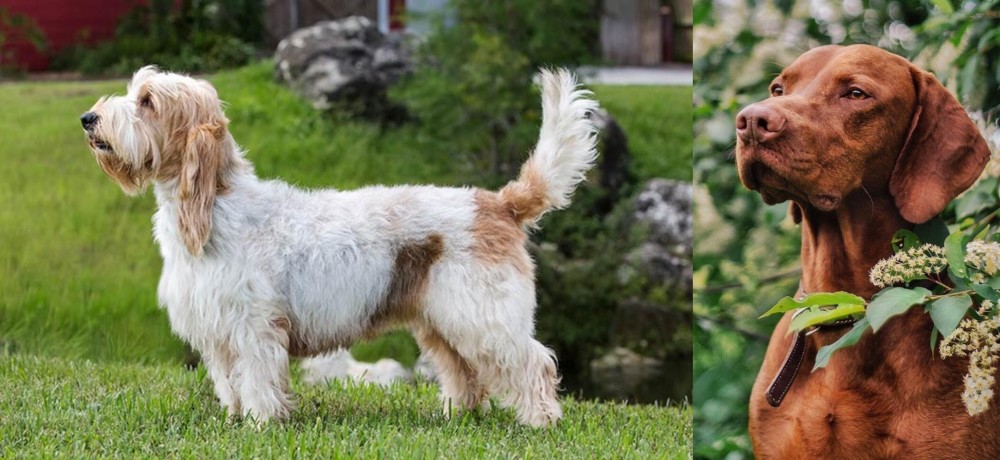 Grand Griffon Vendeen is originated from France but Vizsla is originated from Hungary. Grand Griffon Vendeen may grow 17 cm / 7 inches higher than Vizsla. Grand Griffon Vendeen may weigh 10 kg / 22 pounds lesser than Vizsla. Grand Griffon Vendeen may live 4 years more than Vizsla. Grand Griffon Vendeen may have more litter size than Vizsla. Grand Griffon Vendeen requires Moderate Maintenance. But Vizsla requires Low Maintenance
Grand Griffon Vendeen is originated from France but Vizsla is originated from Hungary. Grand Griffon Vendeen may grow 17 cm / 7 inches higher than Vizsla. Grand Griffon Vendeen may weigh 10 kg / 22 pounds lesser than Vizsla. Grand Griffon Vendeen may live 4 years more than Vizsla. Grand Griffon Vendeen may have more litter size than Vizsla. Grand Griffon Vendeen requires Moderate Maintenance. But Vizsla requires Low Maintenance
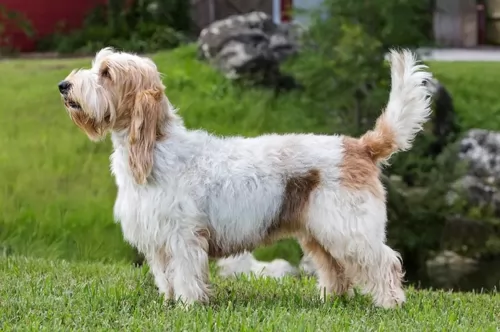 The Grand Basset Griffon Vendeen is a French scenthound that has changed over many centuries. Today the area in France where they originate from, has contributed to the dog's looks.
The Grand Basset Griffon Vendeen is a French scenthound that has changed over many centuries. Today the area in France where they originate from, has contributed to the dog's looks.
The rocky and thorny region of Vendeé required a hardy breed of dog. Also, hunters wanted a slower hound that they could keep up with and the idea was to shorten the legs of the dog.
By the end of the 19th century, the Basset Griffon Vendéen was developed. By the 1950s, the Grand was considered a separate breed.Today the dog is a long-backed and short-legged hunting dog.
 The Hungarian Vizsla or Magyar Vizsla is a hunting dog developed in Hungry. It is the smallest of the pointer-retriever type breeds. They are loyal family dogs and hunt fowl and upland game. It was rare for a hunting dog to also be a companion and family dog, but the Vizsla is. The first time the Vizsla came to the attention of anyone outside its area was 1357 in a publication written for King Louis I of Hungary. They were kept mostly by barons and warlords and preserved without any interbreeding for centuries.
The Hungarian Vizsla or Magyar Vizsla is a hunting dog developed in Hungry. It is the smallest of the pointer-retriever type breeds. They are loyal family dogs and hunt fowl and upland game. It was rare for a hunting dog to also be a companion and family dog, but the Vizsla is. The first time the Vizsla came to the attention of anyone outside its area was 1357 in a publication written for King Louis I of Hungary. They were kept mostly by barons and warlords and preserved without any interbreeding for centuries.
Through all the occupations, revolutions and world wars, the Vizsla survived. Still there were some points in their history where they were almost extinct. In the 1800’s English Pointers and German Shorthaired Pointers almost replaced them. After World War II they were almost extinct again with only a dozen or so left in the country.
Breeders across Hungry brought them back again. They were also bred in Serbia, Slovakia, Austria and Romania. They came to the states after the war and quickly were embraced. The Vizsla Club of America was formed so that they could be recognized by the American Kennel Club. This happened in 1960 and the Vizsla quickly became a champion in several AKC specialties.
The Weimaraner, the German Shorthaired Pointers, the Wirehaired Vizsla and other pointers were developed from the Vizsla and then used to re-establish the breed following World War II.
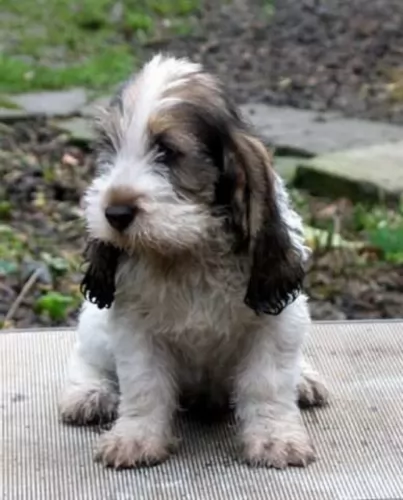 Kept today essentially as a domestic pet, the Grand Basset Griffon Vendéen is a strongly built dog, a rough-coated scent hound of medium size standing at roughly 39 to 45cm in height and weighing 18 to 20kg.
Kept today essentially as a domestic pet, the Grand Basset Griffon Vendéen is a strongly built dog, a rough-coated scent hound of medium size standing at roughly 39 to 45cm in height and weighing 18 to 20kg.
The coat is medium length, shaggy and wiry. It is essentially white with orange markings. Sometimes he can be tri-colored, having a combination of orange, black or tan markings. The double coat is actually regarded as his defining characteristic, being shaggy with a wiry texture that sets him apart from other hound breeds.
His legs are straight, and he is longer than he is tall. He is a deep chested dog with long ears and a long tail. He is also noted for his mustache and beard with long eyebrows.
Your Grand Basset is a courageous, happy, confident dog. He is active and has great stamina. As a social, pack dog, he likes plenty of time spent with his owner, failing which the owner should invest in another dog too so as to be part of a pack. He will get on great with children and he is also a pet-friendly breed who will get on well with cats too. He is sharp and alert and responds well to training and socialization.
 The golden/rust colored Vizsla is easily distinguished from other breed. They are a medium sixed pointer with a lean frame and light on their feet. They have long ears that are silky to the touch and well defined muscular structure. Their nose is a red color blending in with their coat color. Their eyes and nails also blend in with the color of the coat.
The golden/rust colored Vizsla is easily distinguished from other breed. They are a medium sixed pointer with a lean frame and light on their feet. They have long ears that are silky to the touch and well defined muscular structure. Their nose is a red color blending in with their coat color. Their eyes and nails also blend in with the color of the coat.
For the most part they are some shade of golden-rust, but today there are also some solid rust dogs as well. Officially the coat can be russet gold, copper-brown, or dark sandy gold. It cannot be mahogany red or pale yellow. The coat is dense, smooth, short and without an undercoat. They have docked tails as well.
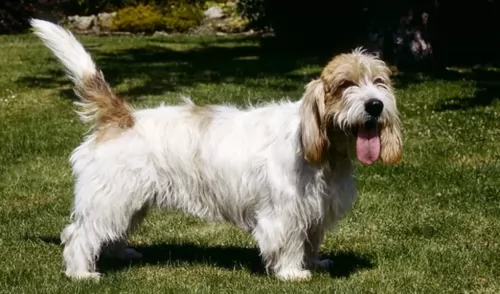 This long-backed, short legged hunting dog has a happy, confident personality. While he was used originally for hunting, he is now commonly kept as a companion.
This long-backed, short legged hunting dog has a happy, confident personality. While he was used originally for hunting, he is now commonly kept as a companion.
He is energetic and independent and will require you having him join you for walks and a ball game too.
Non-aggressive and adaptable he can live in the city or in the countryside so long as he receives plenty of attention and love – then he'll be a splendid pet.
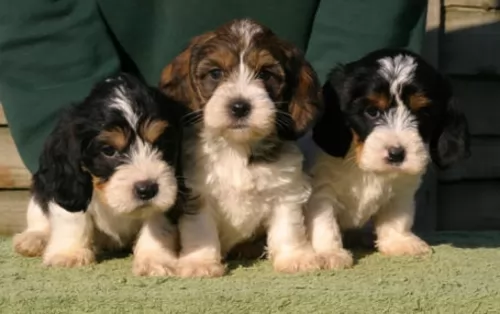 There are some Basset Griffon Vendéens that have reached 17 years of age. This is excellent for these dogs, and lifestyle, nutrition and exercise can all play a part in the longevity of any dog. While he is a pretty robust canine, you'll want to be aware of some of the diseases which may require veterinary intervention.
There are some Basset Griffon Vendéens that have reached 17 years of age. This is excellent for these dogs, and lifestyle, nutrition and exercise can all play a part in the longevity of any dog. While he is a pretty robust canine, you'll want to be aware of some of the diseases which may require veterinary intervention.
Cancer is a major cause of death in elderly dogs, but if caught early, the dog can be cured. These cancers can be malignant lymphoma, skin cancer, bone cancer or soft tissue sarcomas. You'll notice a lump on your pet or a wound that won't heal. When you notice your dog not feeling well, get him to the vet.
Common forms of heart disease in dogs is valvular disease, heart-worm disease and myocardial disease. The signs of heart disease in your pet will depend on the severity of the disease and type.
As heart disease moves on to congestive heart failure, you'll notice symptoms such as difficulty with breathing, fatigue, loss of appetite and weight loss. You need to get your dog immediately to the vet.
Dog allergies can be caused by pollen, medications, food or insects. Your pet will be scratching, he'll have watery eyes and inflamed skin. This inflammatory condition can cause a lot of agony for your pet, driving him mad with the itch and pain. Relieve his discomfort by getting him to the vet as soon as possible.
 The Vizsla have few health issues but the ones they do have are quite serious. They include:
The Vizsla have few health issues but the ones they do have are quite serious. They include:
• Cancer (Mast cell, Lymphoma and Hemangiosarcoma) – as will most dogs it can be treated but is still likely to kill the dog.
• Hip dysplasia is rare, but cases have been noted. Can cause lameness and/or arthritis.
• Sebaceous adenitis – rare skin disease found more often in cats or birds than in dogs.
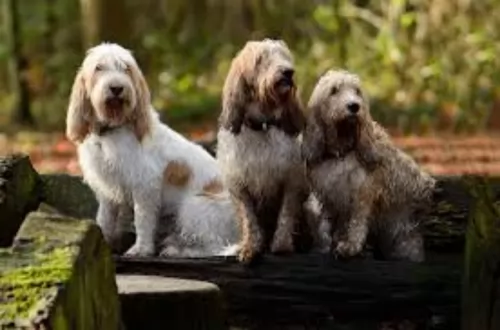 If you are going to be feeding your Grand Basset Griffon Vendéen kibble, there are manufacturers who bring out excellent foods which are breed-specific formulas for age, size and energy levels of dogs.
If you are going to be feeding your Grand Basset Griffon Vendéen kibble, there are manufacturers who bring out excellent foods which are breed-specific formulas for age, size and energy levels of dogs.
Feeding a dog is an individual choice, but good food can increase his longevity. A bit of raw meat mixed into his kibble, or some cooked brown rice, vegetables and chicken will be excellent for him and can add some tasty variety to his diet.
Fresh, cool water must always be available at all times.
The Grand Basset Griffon Vendeen’s coat is double and the rough, harsh coat will need brushing twice a week and stripped once a year.
 Feeding the puppy This is a very active dog and he need a high calorie diet as a puppy. Feed 4-5 cups in 3-4 smaller meals per day.
Feeding the puppy This is a very active dog and he need a high calorie diet as a puppy. Feed 4-5 cups in 3-4 smaller meals per day.
2.Feeding the adult Feed the adult high calorie food if you exercise her enough. Feed 3 cups of food twice a day.
4. Exercise They love to run but don’t’ overdo it until they are at least 18 to 24 months old. They stay very playful their entire lives and excel at AKC competitions. They are good at agility, field trials, scent work, obedience, conformation, dock diving, rally, lure coursing, track and barn hunt.